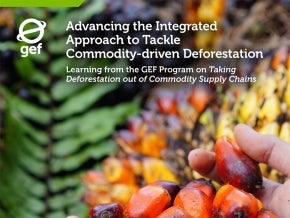
5 June 2012 – As the world celebrates World Environment Day and prepares to gather in Rio for the Rio+20 Conference, the Collaborative Partnership on Forests (CPF), a voluntary arrangement consisting of 14 international organizations, institutions and secretariats, releases eight fact sheets underlining the important role of forests and sustainable forest management (SFM) for human well-being, sustainable development and a green economy.
"The CPF has sought to increase knowledge about the concept of SFM and its relevant contributions to the future of sustainable development", said CPF Chair and Assistant Director General of the FAO Forestry Department Eduardo Rojas-Briales. "The SFM fact sheets show how forests and SFM address the social, economic and environmental aspects of sustainability in a comprehensive manner, and why decision-makers at the upcoming Rio+20 Conference should look to forests to provide many of the answers to meet the challenges of sustainability and move countries toward greener economies".
Sustainable Forest Management: At the heart of sustainable development
The fact sheets highlight the strategic importance of forest ecosystems and SFM in the search for solutions to key global challenges such as climate change, food security, job creation and biodiversity loss, as well as their particular importance to indigenous people and many women living in rural environments. They capture current issues, experiences and knowledge, identify gaps in information and note what is at stake if we ignore these important themes.
"Forests and sustainable forest management provides us with an unprecedented opportunity to transition towards a green economy. Certified timber and energy, community-based partnerships and ecological solutions, all present opportunities to harness the benefits of functioning and well-managed forests," said Achim Steiner, Executive Director of the United Nations Environment Programme.
The fact sheets are a timely reference point for government officials, non-governmental organizations, the private sector and media for understanding forests' role in sustainable development and inclusive green growth and for translating complex and often marginalized issues into tangible and topical examples. The facts sheets focus on eight topics :
o Sustainable Forest Management (SFM) and the multiple functions of forests;
o SFM and primary forests;
o SFM, food security and livelihoods;
o SFM and indigenous peoples;
o SFM and REDD-plus;
o SFM and biodiversity;
o SFM and gender;
o SFM and adaptation to climate change.
The SFM concept
The United Nations General Assembly defines sustainable forest management (SFM) as a "dynamic and evolving concept, which aims to maintain and enhance the economic, social and environmental values of all types of forests, for the benefit of present and future generations". The SFM concept encompasses both natural and planted forests in all geographic regions and climatic zones, and all forest functions, managed for conservation, production or multiple purposes, at the local, national and global levels.
Criteria and indicators exist for various forest zones (boreal, temperate and tropical) to provide a framework for the implementation of SFM based on: the extent of forest resources; biological diversity; forest health and vitality; productive functions; protective functions; socioeconomic functions; and the legal, policy and institutional framework. Certification processes and best-practices guidelines have been developed to guide, assess, attest to and monitor SFM at the forest management unit level.
There has been significant progress in implementing SFM, but many challenges remain. Therefore, the members of the Collaborative Partnership on Forests emphasize that countries must sustainably manage and tap into forest ecosystem services in order to deliver sustainable development and initiate the transition towards greener economies.
The eight fact sheets can be found on www.cpfweb.org in English, French and Spanish, together with a fun multi-choice quiz, to which answers can be found in the fact sheets.
For more information, please contact:
Cesar Sabogal, FAO: +39 06 57054774, Email: cesar.sabogal@fao.org
Steven Johnson, ITTO: +81 45 223 1110 E-mail: johnson@itto.int
Niklas Hagelberg, UNEP: +254 733 684 111, e-mail: niklas.hagelberg@unep.org
Note to Editors:
The Collaborative Partnership on Forests (CPF) is a voluntary arrangement of 14 international organizations and secretariats with substantial programs on forests. The mission of the CPF is to promote sustainable management of all types of forests and to strengthen long-term political commitment to this end.
CPF members:
- Center for International Forestry Research (CIFOR)
- Convention on Biological Diversity (CBD Secretariat)
- Food and Agriculture Organization of the United Nations (FAO)
- Global Environment Facility (GEF)
- International Tropical Timber Organization (ITTO)
- International Union for Conservation of Nature (IUCN)
- International Union of Forest Research Organizations (IUFRO)
- United Nations Convention to Combat Desertification (UNCCD Secretariat)
- United Nations Development Programme (UNDP)
- United Nations Environment Programme (UNEP)
- United Nations Forum on Forests (UNFF Secretariat)
- United Nations Framework Convention on Climate Change (UNFCCC Secretariat)
- World Agroforestry Centre (ICRAF)
- World Bank (World Bank)


